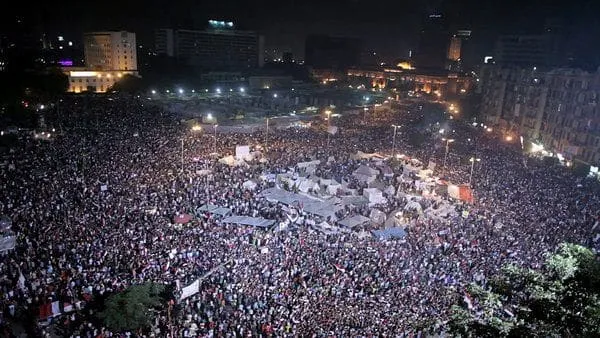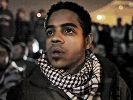Eye For Film >> Movies >> The Square (2013) Film Review
The Square
Reviewed by: Amber Wilkinson

The Arab Spring and its aftermath has proved fertile ground for documentarians, who have taken matters in their own hands to ensure that the revolution(s) will be televised. American-Egyptian filmmaker Jehane Noujaim attempts to capture events and emotions in Egypt in a similar way to the approach used by Ali Samadi Ahadi to document Iranian rebellion in The Green Wave. The big difference is that Noujaim has a considerable amount of skin in the game, often clearly risking injury in order to show what is happening on the streets of Cairo and, particularly, events in Tahrir Square - an innocuous looking roundabout - where the revolution began and which grows to be "symbolic land".
It's testimony to how quickly events are moving in the Middle East - and to the dedication of Noujaim to her film - that The Square has been re-edited since it originally screened at Sundance Film Festival in January 2013, to capture the ongoing turmoil. As a reflection of the mood and struggles of those seeking democratic change it is immersive and visceral even if its up close and personal approach means that the political sphere is rendered in broad brushstroke terms - it is an excellent starting point for those who have little or no knowledge of events in Egypt and is likely to prompt many to seek out further information.

Noujaim has chosen her contributors well. There's Ahmed Hassan, a fresh-faced average Joe whose physical and emotional changes are perhaps the most pronounced through the film, becoming increasingly care-worn as events unfold. From the posh end of the street is Glasgow-born Kite Runner actor Khalid Abdalla - whose cut-glass accent speaks of money and public school but whose politics and heart are with the people of Egypt, while Magdy Ashour is a staunch member of the Muslim Brotherhood. Others come and go but it is this trio who Noujaim focuses on, from the initial euphoria of idealism and shared purpose - "There's no such thing as a Muslim or Christian - one hand" - to the fracturing of their solidarity as time wears on.
Kicking off in January 2011, when Tahrir was first occupied, this is the struggle from the activists' perspective - one that seeks change on a secular basis but finds the waters muddied by religion. Noujaim doesn't pull her punches when it comes to the Muslim Brotherhood, as there is talk of back-room deals being done with the military to ensure their rise to power. Chilling snippets of conversation with army high-ups including General Hamdy Bekheit serve to highlight hypocrisy and suggest the spectre of a military dictatorship. She also illustrates the cyclical nature of the power struggles and problems in Egypt. Magdy has previously been tortured by ousted President Hosni Mubarak's secret police but a change of regime doesn't bring an end to the torture and human rights abuses, just a fresh set of victims from a different community.
Inevitably, there are gaps in this narrative - the finer ins and outs of the flawed election process are left to one side and despite Noujaim being female and including some women's voices in the film, the situation for women who chose to protest in Tahrir - often facing harrassment - is under-explored. This is nevertheless a film that puts names, faces and emotions to a situation which for many outside Egypt may have become 'just another news story'. That we feel more connected to their struggle as a result of watching can surely be no bad thing.
Reviewed on: 09 Jan 2014
















